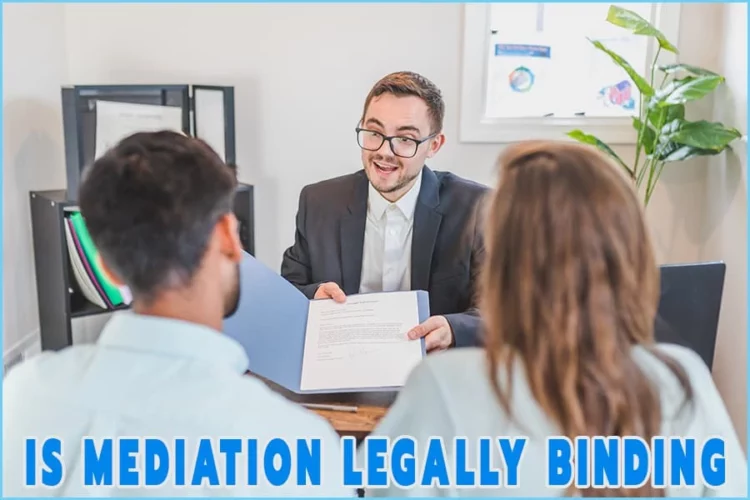Humans are social creatures, so we need to be around each other. The problem is that we are different in personality.
These differences inevitably cause friction between members of society, and there are formal courts to settle these problems.
Not all conflicts make it to court, and some members of the society could come in. These informal courts mostly depend on other people’s cooperation.
Can informal courts meet with legal courts and make mediations legally binding? Let us get into the details and answer this;
Is Mediation Legally Binding?
The ultimate answer is no. Mediation is not legally binding unless the parties reach an agreement and they sign it on a legal document.
You might need to take it to court for approval in most jurisdictions before it is legally binding. In some situations like contracts, it becomes binding once the parties sign the papers.
What Is Mediation?
Mediation IS a big part of modern society, and we need to understand it and its role in our daily lives.
We can’t take all disputes to court, and most minor misunderstandings end through mediation. Let us jump into the details and see what it is all about;
Mediation is where a neutral party holds two parties in conflict to negotiate. Two people can have a contract, and each believes the other person broke the agreement. The natural choice is to go to court and have a jury or judge decide.
The problem is that the court proceedings often take a lot of time since there are a lot of cases. Sometimes it can cost a lot of money and attract a lot of negativity. It is public, so everyone will know about the disagreement, which isn’t always good.
The conflicting parties could decide not to go to court, but what other choice do they have? They two could try to negotiate and understand each other. This discussion might not go well since each party is biased against another.
They could bring in another person, a neutral party. The mediator has to be someone with an unbiased opinion of the two parties. The mediator should not have a stake in any outcome of the argument to make them neutral.
This neutral party will work with both sides to help them negotiate. The third-party becomes a mediator by assisting in the negotiations. The mediator helps parties to negotiate and resolve disputes.
Deeper Details About Mediation Processes
A mediator doesn’t have the power to force the parties to resolve their dispute. Even if they have a solution, the mediator can’t force it on the conflicting parties. The mediator can’t decide who will win the case.
They offer a more conducive environment for the parties to talk and agree. Mediation is an effective alternative to a court hearing which can be extreme. The mediator will talk to the conflicting parties together about the dispute.
A good negotiator will also talk to each party privately to understand their view. The discussions in such mediations are generally confidential. The details stay private, and if all goes well, the parties will get to an agreement.
In most cases, the conflicting parties will write down and sign the new agreement in a settlement agreement.
They can take the agreement to the court for approval, becoming a legal contract. If one party doesn’t follow the terms, the other could sue them.
The judge will then enforce the settlement agreement to force the parties to comply. A judge orders people to try mediation, commonly in cases between family members. The mediator can’t force an agreement if the mediation fails.
The parties will return to court and report the failed mediation. The case will continue in court, where the judge will decide and enforce it. When the process ends in court, disobeying the order is a crime.
What Are The Benefits Of Mediation?
You might want to go to court in an argument since you believe you are right. While the court is a good option, mediation could be better. Mediations are generally friendlier, so you need to see some of their benefits. Let us get into the details for a better understanding;
1. It is faster than court hearings.
Some disputes are time-sensitive, and you can’t afford to wait for the traditional court process. You might have to wait weeks or months before seeing a judge.
This isn’t convenient if you have a business that depends on the agreement, as you will lose a lot of money.
The court process is more complex, and many cases are at the offices. Mediation can resolve your problems in one or two days with only a few meetings. Most mediation for divorce and parenting hours take less than a day.
The same would take months in a public court, which can be disruptive to everyone.
2. It is cheaper than court.
Court processes can be quite expensive in most cases. You will have to pay for an attorney, court reporters, and witnesses. You also need attorneys to prepare exhibit lists, witnesses, and everything else that goes with the court.
These expenses can become a big problem if the case takes time. If you go with mediation, you can pay the mediator for the day.
You can even get a close friend to mediate and help settle the disagreement without spending money.
If you choose to go professional, you will pay your attorney for a day or two. This will total to a cheaper cost. If the disagreement is within a company, it will save the organization money.
3. It is private and confidential.
Everything you say to a mediator in a private session is confidential. The mediator can’t disclose the details to the public or another party without your consent. The cause of your conflict and the final agreement is confidential.
The public will not know about it unless you release the information. In a courthouse, anyone can come in and hear everything going on.
The publicity could make negotiations harder and potentially ruin the company or individual reputation.
Mediations are private, and most times, you will sign a confidentiality agreement before mediations.
The mediator can’t go to court as a witness against you in court for the same case. If you don’t settle, you don’t need to worry about the things you said to your mediator.
4. The parties are more likely to stick to the agreement
Mediation involves the two parties talking and getting to common ground. If mediation works, the final agreement will favor both parties equally. This ensures no one is benefitting at the expense of another person.
People are more agreeable to conditions that they had a say over. So when mediation succeeds, there is a better chance that the parties will follow the terms.
A judge may choose something that one or both parties don’t like, leading to them breaking the agreement.
Mediation allows you to weigh what you are willing to compromise and what you must have. This ensures you are comfortable with the agreement.
5. You can start following the agreement immediately.
The best part about mediation is that you can immediately take up the new terms. You can have mediation in the morning and adopt the new terms by evening. It doesn’t have to conform to a court calendar or dates given by a judge.
This will help you continue your business faster without delaying crucial processes. This speed is especially important in a work environment to keep the jobs going. You will need to take the agreement to a judge to make it legally binding.
This step will not take a lot of time, and you could be ready in a few hours. You will give a judge the papers for review; they might make a few changes or ask some questions. The judge will then sign the agreement, and it will be a legal document.
6. Mediation is gentler on relationships.
This advantage is one that most people overlook, but mediations offer a chance to preserve relationships.
This part is why many judges order mediation for family disputes. Mediation is private, and it allows room for emotions and considerations.
If you disagree with a friend, there is a high chance you will keep the friendship. Courts will make the case logical, and it could get personal and inconsiderate. As such, the terms will damage the relationship after solving the dispute.
This makes mediation perfect for family members. You will have a healthy relationship after settling your disputes.
Divorce and parenting time mediations will be better than going to court and putting children through that mess.
Conclusion
Is mediation legally binding? You now know that mediation is not legally binding by default. Mediation is an excellent means of conflict resolution, and you will benefit from it. There are other ways of resolving conflict, but this is one of the most reliable.
You can save time and money by using mediation. You will be able to get an agreeable solution for both parties in private. This makes it more agreeable to both parties; hence they will be more likely to follow the agreement.










